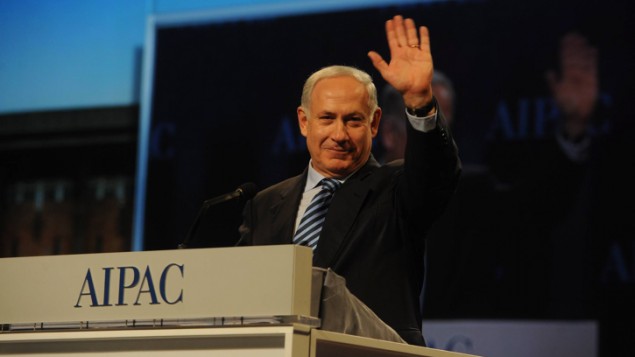In recent weeks, a few incidents have begun to raise questions about the vaunted power of the so-called “Israel Lobby” and whether its influence might be waning. First there were the AIPAC-backed congressional bills that sought to level sanctions on the Palestinian Authority to punish it for having gone to the United Nations in seeking and winning an upgrade in their status to one that implied statehood and granted it a few more rights in the international system. Those bills both died before reaching the floors of the Senate and House of Representatives. More recently, there was the row over Chuck Hagel’s nomination as Secretary of Defense. That nomination went forward and it has since become evident that, despite some disparaging comments from a few Senators, Hagel is likely to be confirmed.
Those aren’t small failures for “the Lobby”, but the circumstances around them should be examined to put them in context. The two events do indicate the potential beginnings of a shift in the discourse around US policy in the Middle East, but it’s important not to make more out of this than there is.
On the matter of punishing the PA, the Jewish Telegraphic Agency mused on the significance of the fact that AIPAC found itself opposed by the Reform movement, the largest American Jewish denomination, led by the Union for Reform Judaism. This was unusual, not because more liberal Jewish organizations might disagree with AIPAC, but because they would actually advocate an opposing position in public. This supports the notion that the new “pro-Israel, pro-peace” lobbying group, J Street, has indeed opened up some space for discussion within the pivotal Jewish community about how the US might respond to events between Israel and the Palestinians.
This shouldn’t be exaggerated, however. J Street, for one thing, has also put itself into a position of redefining the boundaries of acceptable discourse, not necessarily opening it up. This was evidenced last year when J Street made clear its opposition to Christian groups taking any action that might put a small amount of pressure on the Netanyahu government to change its obstructionist stances. First there was J Street’s opposition to a Presbyterian initiative to divest from the occupation (carefully worded to avoid divestment from or boycott of Israel itself) and later its condemnation of a letter from church leaders calling for a review of whether US military aid to Israel was being used to support settlements and occupation and therefore violated US law.
This latest episode, while demonstrating that J Street has had impact in somewhat moving the boundaries of discourse, was not about policy, but about tactics. On one hand, AIPAC pushed for punitive measures to address what Israel saw as a grievance. On the other, the Reform movement took up the J Street line, which said that the proposed punishment would undermine Israeli interests. None of this challenges policy; it merely reflects a disagreement about how best to serve Israel’s interests.
On the Hagel nomination, AIPAC’s silence was deafening from the start. The opposition was led entirely by radical neoconservatives like Elliott Abrams, Bill Kristol and, organizationally by the demonstrably marginal Emergency Committee for Israel. Still, more mainstream Jewish leaders like Abraham Foxman of the Anti-Defamation League and David Harris of the American Jewish Committee, as well as leading Senate Republicans Mitch McConnell, John McCain and Lindsey Graham, expressed opposition to Hagel’s nomination.
But AIPAC understood that this was not a winning fight from the beginning and stayed out of it, at least in terms of the public arena. Leading Jewish Democrats also stayed silent or expressed support for Hagel. J Street supported Hagel, which was only natural since Hagel had spoken at one of their conferences, and the Israeli government, still reeling from backing the wrong horse in the presidential election, made it clear they were not going to oppose him.
AIPAC is really good at what it does. One of its chief skills has always been avoiding fights it won’t certainly win. It never intended to get into a fight over Hagel, so it left the fight to extremist groups like the ECI. But do these two incidents show that the Lobby is losing its grip?
I would emphasize the extent to which the Lobby operates on fear. I don’t mean to suggest that it doesn’t wield real power, it does. But that power is greatly magnified by two factors: the lack of an opposing force and an exaggerated belief in the extent of that power.
We are starting to see the waning of the Lobby’s power. Some of this is due to J Street in a small way, but in the end they will be replacing one problem with another if they succeed, as explained above. But the fact that there is a much greater light shining on the Lobby helps put their real power in perspective. It started with Stephen Walt’s and John Mearsheimer’s groundbreaking work, and has continued to the point where we now see columnists ranging from Glenn Greenwald and Andrew Sullivan to Thomas Friedman openly discussing the lobby’s power.
I will use the dreaded word anti-Semitism here, because it has long been my view that, while outside observers gauge the Lobby’s power by the extent to which it has influenced US policy (an accurate measure), on the Hill, a lot of the belief in the Lobby’s power is a self-fulfilling prophecy that is based only in varying degrees on the Lobby’s actual successes and mostly on a long-held myth and belief that “the Jews” hold far more power than they do, as has been the case for centuries.
The Lobby possesses real power, but that power has taken on an almost mythical status. That’s partly because of a near absence of a counter to the Lobby. J Street and a few other groups are finally starting to create that, but it remains minimal for now. The lobby’s main focus is also foreign policy, which is rarely high on a Congress member’s list of priorities when he or she thinks about re-election. They would rather focus on domestic initiatives that actually matter to their voters than take on the Lobby. But it is also true that the Lobby’s past successes scare people more than they should. Few Jews, much less any other group of US citizens, cast their votes based on Israel, one way or the other.
The myth of exaggerated Jewish power, rooted in classical anti-Semitism, is also starting to be revealed for the sham it is. Yes, Jews make up a vastly disproportionate piece of the Democratic donor base, but consider this: in the 2012 election cycle, pro-Israel PACs contributed a total of just over $12 million. Of that money, a little more than $1 million came from J Street’s PAC. Mitt Romney and Barack Obama split about $1.43 million just about evenly. Between the two of them, they spent over $1.1 billion. Yes, individual Jewish donors give quite a bit, but poll after poll shows that Jews don’t vote based on Israel. A few major individual donors might give on this basis (Sheldon Adelson on the Republican side, Haim Saban for the Democrats), but this by itself cannot explain the slavish devotion shown in Washington to Israel. What can explain it is the prevailing myth that Jews and Jewish money are fully tied to Israel policy and are a pivotal pot of gold in election cycles. This anti-Semitic myth has been, ironically, perpetuated by virtually every major Jewish organization with AIPAC in the lead. Whether it’s true or not, the belief that it’s true has made it so.
But as this myth is revealed to be the smoke and mirrors that it is, so too are some of the effects of the Lobby’s history in elections blunted. And as more critical narratives across a broad spectrum of media arise, so too is the Lobby’s real power affected. We’re still missing an actual c4 lobby that can raise significant funds and advocate for Palestinian interests (as opposed to “peace,” two states or peace for Israel’s sake — that is, a lobby which, like the Israel Lobby, advocates for Palestinian interests alone). But existing factors are indeed changing the game. Too slowly, for sure, and these are all gains that can be wiped out and even reversed in a very short time. But it’s the first time since 1987 that I can recall seeing the Lobby’s influence taking a step back.
Slowly but surely, debate over US policy in the Middle East is starting to open up, and the machinations of AIPAC and the Lobby are being revealed, making it more difficult for it to operate. As a US Jew, I am also gratified to see that the exaggerated perception of Jewish power is beginning to wane. These are small steps and don’t indicate that things are going to change profoundly any time soon. But they are seeds for a more rational US policy and that gives me hope.






My issue with this article is I think the author worries too much over perceived power and old ideas of anti-semitism rather than the realities that currently exist
It is true a Jewish/neocon cabal, transparent or not, pushed us into a war with Iraq for Israeli needs.
It is true that netanyahu can get the US Congress to clap like seals whenever he wants
It is true that with the exception of a few unique individuals (often Jews themselves) that the Israel Lobby has a hammerlock on any media discussion of the realities of the Israeli Apartheid state
I could list about 20 more examples of REAL power that the Israel Lobby wields – along with the fear factor accompanying it
To say a neocon coup has taken over our foreign policy, our media, and our politics is not an exaggeration – despite a few exceptions that prove the rule